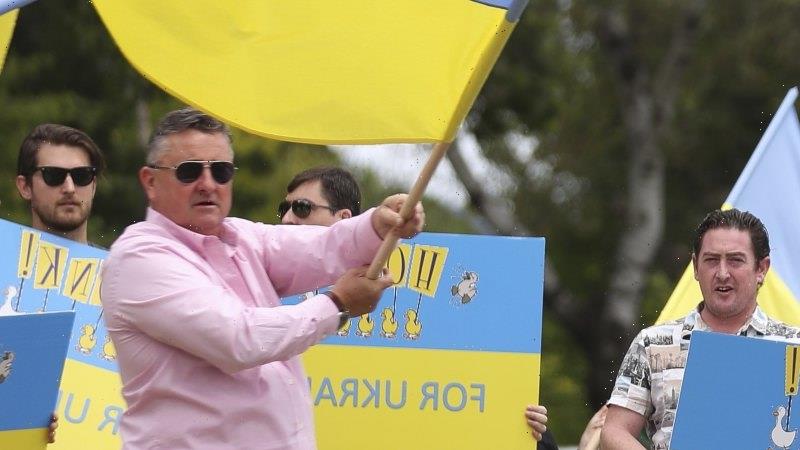The ambassador and staff at the Russian Embassy in Canberra are being treated to a ceaseless chorus of car horns as motorists on the busy avenue outside answer the invitation of pro-Ukraine protesters to hit their hooters as they drive by.
It’s an inconvenience barely worthy of the name, given the Russian diplomats inside are occupied uploading propaganda to their Twitter, Facebook and other social media accounts, dismissing Russian war crimes in Ukraine as fake news.
Ukraine supporters protest outside the Russian embassy in Canberra last month.Credit: Alex Ellinghausen
The embassy’s official Twitter account, Russia in Australia (@RusEmbAu) went all out this week running the appalling claim that the murder of civilians in the suburb of Bucha, on the outskirts of Ukraine’s capital, Kyiv, was “a false flag attack by the Kiev [sic] regime and its Western sponsors”.
Given that satellite images showed bodies strewn about Bucha for weeks while Russian soldiers occupied the city, the embassy’s lies were both wicked and pathetic.
As their tweets went out, numerous reputable news organisations filmed bodies of those who had been shot after having their hands and feet tied, and more than 5000 cases of alleged war crimes – including rape – were being documented for international investigators.
The efforts of Russian President Vladimir Putin’s agents in Australia to amplify the abhorrent falsehoods being fed to a Russian population all but cut off from the outside world by his indoctrination machine are peculiar: the unfiltered truth is freely available here.
Dr Alexey Pavlovsky, Russia’s ambassador to Australia.Credit:Alex Ellinghausen
They are, pretty clearly, doing the bidding of the regime in the knowledge that their careers and perhaps their physical wellbeing would be in peril if they did otherwise.
Those occupying the Russian embassy in Canberra ought, perhaps, to consider themselves fortunate to have been posted to a polite place where the incessant honking of car horns is their worst bother.
The Australian government – which has sent humanitarian aid and weaponry to Ukraine – decided this week not to expel these envoys of a brutal regime on the basis that Russia would most likely close Australia’s embassy in Moscow, and Australians still in Russia could find themselves at risk.
These were risks some European countries, including France, Italy, Denmark, Sweden and Spain, were willing to take.
They have expelled Russian diplomats by the score.
The more timorous Australian government, however, preferred to wait to see what action its intelligence partners – the United States, Britain, Canada and Ireland – might take.
This satellite image provided by Maxar Technologies shows an overview of Bucha, with the church of St Andrew at centre and the site of a probable mass grave.Credit:AP
Russian diplomats in Dublin, by comparison, learned what it is to be placed in the deep freeze by the Irish, a wildly hospitable people who have long been experts at giving the coldest of cold shoulders – and worse – to outsiders who displease them.
As much of the Western world placed sanctions on the Russian Federation and Putin’s cronies, the absurd oligarchs, Dubliners chose direct action against those sent to their city by Moscow.
This week, with Dublin’s maximum temperature hovering between 9 and 11 degrees, the local fuel provider refused to deliver diesel, which is used to heat the embassy and provide hot water.
Destroyed apartment buildings in the Ukrainian city of Borodyanka following the Russian invasion.Credit:AP
If the Russian diplomats hoped to find an alternative supplier, they were out of luck. No one wanted to help, and anyway, the Russians would have trouble paying: the Bank of Ireland suspended the embassy’s accounts, according to the Irish Mirror.
The Irish, wordsmiths without peer, clearly remembered the meaning of a word they gave to the world in 1880: boycott.
Inadequate ideological warriors disparage the word these days by replacing it with the ugly term “cancel culture”, as if there were something wrong with turning one’s back on behaviour that offends. But then, the same sad manglers of language still misuse the word “woke” to criticise those who are awake to their miserable views of the world.
The word boycott, however, has an honourable and effective genesis in what was known as the Land War of Ireland, at a time when almost all the country’s arable land was owned by absentee landlords from England.
Captain Charles Boycott, the agent of an absentee landlord, sought in 1880 to evict tenant farmers who wanted a 25 per cent reduction in their rents after a particularly poor season. Eviction would mean starvation.
Charles Stewart Parnell, the Irish leader of the Land League which demanded justice for tenants, proposed that any tenant who occupied a farm where another was evicted should be shunned.
Boycott found himself “socially excommunicated”.
Boycott’s workers refused to serve him in any capacity, businesses quit trading with him, even the local postman stopped delivering mail, and the fields went unharvested.
And so was born the verb “to boycott”, which governments call “sanctions” and fools call “cancel culture”.
With Dubliners reviving the art of the boycott this week, the Russian ambassador there was reduced to begging for help from the Irish Department of Foreign Affairs, which wasn’t commenting.
Conditions, said the ambassador, were “frankly difficult”.
Not as difficult, we might reflect, as for Ukrainian citizens trapped and terrorised in destroyed cities and villages.
Documented by Ukrainian journalist Anastasiia Lapatina at The Kyiv Independent, desperate Ukrainian parents have taken to writing on the skin of their children. They print the child’s name, age, blood group and telephone numbers of relatives and friends in the hope someone might help if the child is suddenly, brutally orphaned.
In Australia, where the current government allows Russian diplomats to stay and tweet vicious lies, we honk horns.
Get a note directly from our foreign correspondents on what’s making headlines around the world. Sign up for the weekly What in the World newsletter here.
Most Viewed in National
From our partners
Source: Read Full Article




